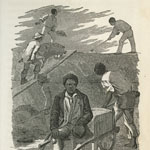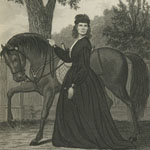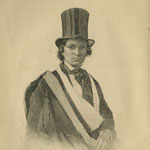
|
S. Emma E. Edmonds Nurse and Spy in the Union Army: Comprising the Adventures and Experiences of a Woman in Hospitals, Camps, and Battle-Fields. [Hartford, Conn.]: W. S. Williams & Co., 1865.
Edmonds’ best-selling memoir detailed her escapades as a soldier, nurse, mail and dispatch carrier, and spy. Here she is depicted in one of the many disguises she employed as a spy. She transformed into an African American man by obtaining “real, plantation style” clothing, having her hair sheared close to her head, donning a wig, and blackening her face, neck, arms, and hands. Penetrating the Confederate line, she blended in with the slaves working on the fortifications. She drew a rough sketch of their outer works, made notes on their mounted guns, and overheard the soldiers discussing valuable information on reinforcements, all of which she was able to report back to the Union. |
 |
George E. Perine, engraver. Portrait of S. E. E. Edmonds from Nurse and Spy in the Union Army: Comprising the Adventures and Experiences of a Woman in Hospitals, Camps, and Battle-Fields. [Hartford, Conn.]: W. S. Williams & Co., 1865. [Facsimile].
|
 |
William Craft. Running a Thousand Miles for Freedom; Or, the Escape of William and Ellen Craft from Slavery. London: William Tweedie, 1861.
Ellen Craft not only concealed her gender but also her race. Ellen and her husband William devised a plan to escape slavery by Ellen dressing as a white master with William acting as her slave. Ingeniously, she acted as an invalid, giving her an excuse to retire to her room and seldom speak. A poultice in a handkerchief was tied over her head to cover her smooth, beardless face, and a pair of spectacles completed the look. Because she could not write, her hand was bound in a sling so she had an excuse to ask someone else to register her name, “William Johnson.” On their journey from Georgia, they were almost stopped in Baltimore. Lacking the correct papers, sympathy for being invalid allowed them to go onward towards Philadelphia and their freedom. |